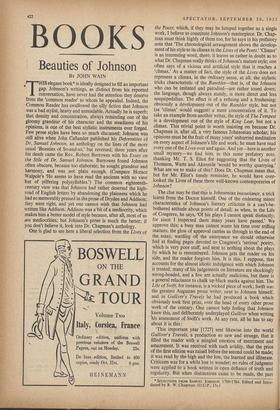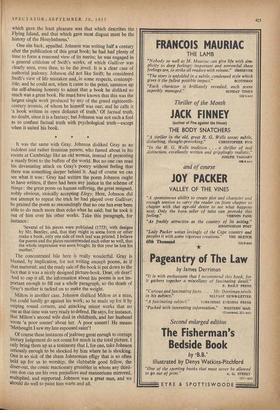BOOKS
Beauties of Johnson
BY JOHN WAIN HIS elegant book* is ideally designed to fill an important • gap. Johnson's writings, as distinct from his reported conversation, have never had the attention they deserve from the 'common reader' to whom he appealed. Indeed, the Common Reader has swallowed the silly fiction that Johnson was a bad stylist, heavy and unreadable. Actually he is superb; that density and concentration, always reminding one of the gloomy grandeur of his character and the steadiness of his opinions, is one of the best stylistic instruments ever forged. Few prose styles have been so much discussed; Johnson was still alive when John Callander published his Deformities of Dr. Samuel Johnson, an anthology on the lines of the more usual 'Beauties of So-and-so,' but reversed; three years after his death came the Rev. Robert Burrowes with his Essay on the Stile of Dr. Samuel Johnson. Burrowes found Johnson often obscure, because too elaborate; he sought grandeur and harmony, and was not plain enough. (Compare Horace Walpole's 'He seems to have read the ancients with no view but of pilfering polysyllables.') The common eighteenth- century view was that Johnson had rather deserted the high- road of English letters by abandoning the plainness which he had so memorably praised in the prose of Dryden and Addison; they were right, and yet one cannot wish that Johnson had written like Addison. Addison was a bit of a mediocrity, which makes him a better model of style because, after all, most of us are mediocrities; but Johnson's prose is much the better; if you don't believe it, look into Dr. Chapman's anthology.
One is glad to see here a liberal selection from the Lives of the Poets; which, if they may be lumped together as a single work, I believe to constitute Johnson's masterpiece. Dr. Chap- man must think highly of them too, for he says in his prefatory note that 'The chronological arrangement shows the develop- ment of his style to its climax in the Lives of the Poets: 'Climax' is an interesting word, there; it leaves us rather in doubt as to what Dr. Chapman really thinks of Johnson's mature style; one often says of a vicious and artificial style that it reaches a 'climax.' As a matter of fact, the style of the Lives does not represent a climax, in the ordinary sense, at all; the stylistic tricks characteristic of the Rambler—that is, of the Johnson who can be imitated and parodied—are rather toned down; the language, though always stately, is more direct and less sesquipedalian. The effect is of a refining and a freshening; obviously a development out of the Rambler style, but not (as 'climax' would suggest) a mere concentration of it. To take an example from another writer, the style of The Tempest is a development out of the style of King Lear, but not a climax. This trivial point is worth insisting on because Dr. Chapman is, after all, a very famous Johnsonian scholar; his opinions must be the fruit of many years' unhurried meditation on every aspect of Johnson's life and work; he must have read every one of the Lives over and again. And yet—here is another small mystery—we find him, in this same prefatory note, thanking Mr. T. S. Eliot for suggesting that the Lives of Thomson. Watts and Akenside 'would be worthy quarrying.' What are we to make of this? Does Dr. Chapman mean that, but for Mr. Eliot's timely reminder, he would have over- looked the Lives of these three well-known contemporaries of Johnson?
The clue may be that this is Johnsonian insouciance, a trick learnt from the Doctor himself. One of the endearing minor characteristics of Johnson's literary criticism is a can't-be- bothered attitude about points of detail; as when, in the Life of Congreve, he says, 'Of his plays I cannot speak distinctly; for since I inspected them many years have passed? We approve this; a busy man cannot waste his time over trifling matters; the glow of approval carries us through to the end of the essay, warding off the annoyance we should otherwise feel at finding pages devoted to Congreve's 'serious' poetry, which is very poor stuff, and next to nothing about the plays by which he is remembered. Johnson gets the reader on his side, and the reader forgives him. It is this, I suppose, that accounts for the almost idiotic indulgence with which Johnson is treated; many of his judgements on literature are shockingly wrong-headed, and a few are actually malicious, but there is a general reluctance to chalk up black marks against him. The Life of Swift, for instance, is a wicked piece of work; Swift was the greatest Augustan prose writer, next to Johnson himself. and in Gulliver's Travels he had produced a book which obviously took first prize, over the head of every other prose work of the century. One cannot help feeling that Johnson knew this, and deliberately underplayed Gulliver when writing his assessment of Swift's work. At any rate, all he has to say about it is this : 'This important year [1727] sent likewise into the world Gulliver's Travels, a production so new and strange, that it filled the reader with a mingled emotion of merriment and amazement. It was received with such avidity, that the price of the first edition was raised before the second could be made; it was read by the high and the low, the learned and illiterate. Criticism was for a while lost in wonder; no rules of judgment were applied to a book written in open defiance of truth and regularity. But when distinctions came to be made, the part
SELECTIONS FROM SAMUEL JOHNSON. 1709-1784. Edited and Intro- duced by R. W. Chapman. (0.U.P., 15s.)
which gave the least pleasure was that which describes the Flying Island, and that which gave most disgust must be the history of the Houyhnhnms.'
One sits back, appalled. Johnson was writing half a century after the publication of this great book; he had had plenty of time to form a reasoned view of its merits; he was engaged in a general criticism of Swift's works, of which Gulliver was clearly seen, even then; to be the jewel. It is a clear case of authorial jealousy. Johnson did not like Swift; he considered Swift's view of life mistaken and, in some respects, contempt- ible; and he could not, when it came to the point, summon up the self-abasing honesty to admit that a book he disliked so much was a great book. He must have known that this was the largest single work produced by any of the grand eighteenth- century ironists, of whom be himself was one; and he calls it 'a book written in open defiance of truth.' Of factual truth, no doubt, since it is a fantasy: but Johnson was not such a fool as to confuse factual truth with psychological truth—except when it suited his book.
It was the same with Gray. Johnson disliked Gray as an indolent and rather feminine person, who fussed about in his rooms at Cambridge like an old woman, instead of presenting a manly front to the buffets of the world. But no one can read his devastating attack on Gray's poetry without feeling that there was something deeper behind it. And of course we can see what it was: Gray had written the poem Johnson ought to have written, if there had been any justice in the scheme of things : the great poem on human suffering, the great resigned. nobly obvious, stoically accepting Elegy. Here, Johnson did not attempt to repeat the trick he had played over Gulliver; he praised the poem so resoundingly that no one has ever been able to do much more than echo what he said; but he took it out of him over his other works. Take this paragraph, for instance: 'Several of his pieces were published (1753), with designs by Mr. Bentley, and, that they might in some form or other make a book, only one side of each leaf was printed. I believe the poems and the plates recommended each other so well, that the whole impression was soon bought. In this year he lost his mother.'
The concentrated bile here is really wonderful. Gray is blamed, by implication, for not writing engugh poems, as if that mattered; and the ready sale of the book i put down to the fact that it was a nicely designed picture-book. Dear, oh dead And to cap it all, the information about his poems is not im- portant enough to fill out a whole paragraph, so the death of Gray's mother is tacked on to make the weight.
Milton is another case. Johnson disliked Milton as a man, but could hardly go against his work; so he made up for it by sniping round corners, and attacking minor works that no one at that time was very ready to defend. He says, for instance, that Milton's second wife died in childbirth, and her husband wrote 'a poor sonnet' about her. A poor sonnet He means `Methought I saw my late espoused saint'!
Of course these instances of jealousy great enough to corrupt literary judgement do not count for much in the total picture. I only bring them up as a testimony that I, for one, take Johnson seriously enough to be shocked by him where he is shocking. One is so sick of the sham Johnsonian effigy that is so often held up for us to worship; the clubbable good fellow, the diner-out, the comic reactionary grumbler in whom any third- rate don can see his own prejudices and mannerisms mirrored, multiplied, and supported. Johnson was a great man, and we should do well to paint him warts and all.



































 Previous page
Previous page